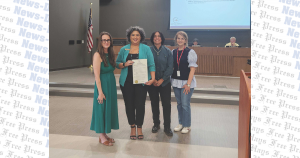By Paige Lambert
Melissa Rodriguez and her brother met after years of hurt and frustration caused by his drug addiction.
As they talked, he explained his addictions stemmed from concealing the abuse he received as a child.
“We never talked about it as a family,” Rodriguez said. “And when he went to treatment, he said every single person had childhood trauma, every single one.”
Rodriguez, director of community partnerships for the Hays-Caldwell Women’s Center (HCWC), said one of the biggest issues with child abuse is the victim or family won’t talk about it.
“It is not uncommon for them to keep a secret and not go to mom or dad immediately,” Rodriguez said. “Even to parents that say if anyone ever does anything you need to tell me.”
She said feelings of shame or embarrassment keep the child from going to the parents because they typically know the abuser.
According to a Children’s Bureau 2014 Child Maltreatment report, 93.2 percent of abusers had some form of a relationship with the child – whether as parent, teacher, friend of family or other instances.
Familial abusers are more likely because the family doesn’t want to confront the issue or the victim doesn’t want to cause trouble, Rodriguez said.
“We are sending them this message that it’s okay. And why? Because they are family,” she said. “And we are sending a message to the victim that they don’t matter as much.”
The children at risk for prolonged trauma, even into adulthood, are those whose parents are unsupportive or don’t believe them, Rodriguez said.
Unbelieving parents tend to be the least likely to take the child to therapy, follow up and especially be supportive through the criminal justice process, she said.
“All those things compound in a child and can make their efforts at healing more difficult,” Rodriguez said. “They tend to take back their allegation because they don’t have the support of a mom.”
Rodriguez said her own mother didn’t want to talk about her brother’s abuse for fear that bringing it up would cause him more pain.
Julie Ramsay New, Greater San Marcos Youth Council director, said most parents want to help their children, but don’t know how.
The council offers parental counseling for those whose kids may be abused, or use the council’s service, New said.
“Most people want to be good parents,” New said. “If you have a little bit of education and support, you can be.”
Rodriguez said the best thing a family member can do is be part of a child’s support network.
Many of the therapies and recovery processes at HCWC include the parents and focus on how to move forward as a unit.
“The truth is when trauma happens to your child it happens to your family unit,” Rodriquez said. “This changes not just their life but it changed yours too and you need to process that.”
She said many times, an adult’s history of abuse will come out while attending therapy for their own child.
Keeping the abuse hidden has shown to create patterns of abuse in the person’s life, whether it is with drugs, alcohol or sexual abuse, Rodriguez said.
“I know what keeping it a secret does, I know the dangers that are involved with that,” Rodriguez said. “I also know there is power in healing and recovery.”






